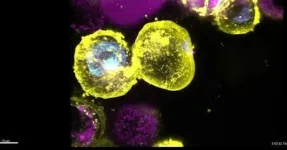(Press-News.org) A shift in the way we think about the benefits mangroves provide to coastal regions could yield significant economic and biodiversity gains and protect millions from flooding, research has revealed.
The University of Queensland-led study shows current conservation efforts typically target biodiversity protection whilst minimising conflict with economic interests, while failing to consider the huge benefits provided by ecosystems.
Alvise Dabalà, now at the University of the Azores and whose Masters project at UQ formed the basis of this study, said human activities, such as deforestation and coastal development have led to extensive mangrove loss across the globe.
“They protect infrastructure and communities from storms, sequester carbon, and provide fisheries with nursing grounds, so their rapid destruction is devastating to witness,” Mr Dabalà said.
“As it stands, current conservation efforts just aren’t doing enough to take advantage of these services.”
The team is using the United Nations’ Global Biodiversity Framework, which recommends an increase in protected areas to 30 per cent of the world as the basis of their proposal.
Researchers are recommending an optimised conservation planning perspective that operates within this framework and puts more emphasis on these ecosystem services.
“It’s somewhat of a juggling act, where we have to consider the trade-offs between biodiversity protection, economic conflicts, and ecosystem services,” Mr Dabalà said.
“But if done properly, this target has the potential to safeguard AU$25.6 billion of coastal property value, globally.
“It would also protect 6.1 million coastal-dwelling people against the impacts of flooding, and safeguard over one billion tonnes of sequestered carbon.
“In Australia alone, we’ve identified priority areas in Northern Queensland, Darwin and East Arnhem in the Northern Territory, and between Pilbara and Kimberley in Western Australia.
“Expanding Australian mangrove protection would be particularly beneficial for carbon sequestration and biodiversity conservation as they stand out as some of the most diverse, carbon-rich mangrove forests.”
UQ’s Professor Anthony Richardson said to achieve these outcomes boils down to a shift in perspective.
“In some areas of the world, we recognise that human pressure could be so high that the value of ecosystem services would not compensate for the loss and could result in complications in implementing protection,” Professor Richardson said.
“However, for multiple ecosystems, including mangroves, we’ve quantified the benefits associated with considering the services these ecosystems provide – the figures are undeniable.
“We know that long-term gains from biodiversity protection are often greater than short-term gains from anthropogenic activities, so this shift in thinking must happen soon.”
Professor Richardson said developing biodiversity and ecosystem services data should be a priority to incorporate into applied conservation plans.
“Implementation of these plans should then follow different conservation practices that target local communities' needs specifically,” he said.
“Moving forward, decision-makers and other stakeholders need to focus on protected area implementation, management, and monitoring to provide solid conservation outcomes.”
This research is published in Nature Communications.
END
Improved mangrove conservation could yield cash, carbon, coastal benefits
2023-10-03
ELSE PRESS RELEASES FROM THIS DATE:
Brain biometrics help identify sports concussions
2023-10-03
Novel brain biometrics could help inform whether an athlete is ready to return to play following a concussion, according to new research from the University of South Australia.
Conducted in partnership with the University of California San Francisco (UCFC), researchers found that changes in micromovements of the brain – termed ‘headpulses’ – could detect the lasting impacts of a concussion.
Using a custom-designed headset* to evaluate headpulse biometrics among 101 amateur male and female Australian ...
Study uncovers reasons Americans did not get booster vaccines
2023-10-03
The paper, “Understanding low bivalent COVID-19 booster uptake among US adults,” was published in the journal Vaccine.
“Our results indicate that we have a lot more work to do in terms of educating the public and health care providers about the importance of staying up to date on COVID-19 boosters,” said first author Elizabeth Jacobs, PhD, professor of epidemiology at the Zuckerman College of Public Health, who led the research with associate professor of epidemiology Kristen Pogreba-Brown, PhD, MPH.
Nearly 40% of survey participants reported they did not get a booster shot because ...
Texas engineers land semiconductor grants through CHIPS Act-backed NSF program
2023-10-03
A pair of Cockrell School research teams are part of a massive semiconductor grant program from the National Science Foundation that includes funds from industry leaders and the federal CHIPS Act.
The projects are part of the NSF Future of Semiconductors (FuSe) program through a public-private partnership between NSF and four major tech companies: Ericsson, IBM, Intel and Samsung. FuSe aims to enable rapid progress in new semiconductor technologies and manufacturing as well as workforce development.
Altogether, the program will support 24 research and ...
Gut bacteria found in wild wolves may be key to improving domestic dogs’ health
2023-10-03
BEND, Ore. – Gut microbes found in wild wolves may be the key to alleviating a debilitating gastrointestinal condition common to domestic dogs, according to a study led by researchers at Oregon State University – Cascades.
In a paper published in Applied Microbiology, the authors report a novel strain of Paenibacillus bacteria with characteristics of a probiotic – an organism that conveys a health benefit to the host.
In this case, the benefit would be to head off canine inflammatory ...
Host genetics helps explain childhood cancer survivors’ mortality risk from second cancers
2023-10-03
(MEMPHIS, Tenn. – October 02, 2023) The population of childhood cancer survivors in the U.S. is increasing, with an overall childhood cancer survival rate greater than 85% five years after diagnosis. However, survivors can still be at increased risk of various health conditions, including second cancers. Using data from the Childhood Cancer Survivor Study (CCSS) and the St. Jude Lifetime Cohort Study (St. Jude Life), scientists at St. Jude Children’s Research Hospital have identified a genetic ...
How floods kill, long after the water has gone – global decade-long study
2023-10-03
With New York declared a state of emergency following flash flooding, there is increasing concern such events will become more common globally.
Now a study led by Monash University scientists in Australia has found that people impacted by a flooding event are at significantly increased risk of dying – including heart and lung problems – in a crucial window between three and six weeks after the event, even after the flooding has dissipated.
The study, published today in the BMJ, found that the risk of dying increased and persisted for up to 60 days (50 days for cardiovascular mortality) after a flooded day - increasing by for 2.1% for all-cause deaths, 2.6% for cardiovascular ...
USC joins LA-area stem cell institutes in forming a regenerative medicine consortium
2023-10-03
USC is partnering with seven of Los Angeles’ leading regenerative medicine institutes to form the Los Angeles and surrounding area regenerative medicine consortium (LA-RMC), with the goal of fulfilling the promise of the California Institute for Regenerative Medicine (CIRM): to develop laboratory discoveries into treatments for patients with unmet medical needs.
CIRM, the voter-created agency that provides public funding for stem cell research in California, is dedicated to advancing regenerative medicine, which uses stem cells and related approaches to treat disease and disorders. Regenerative ...
When cells go boom: study reveals inflammation-causing gene carried by millions
2023-10-03
Australian researchers at WEHI have found that a genetic change that increases the risk of inflammation, through a process described as ‘explosive’ cell death, is carried by up to 3% of the global population.
The study may explain why some people have an increased chance of developing conditions like inflammatory bowel disease or suffer more severe reactions to infections with bacteria like Salmonella.
At a glance
MLKL is a gene essential to triggering necroptotic cell death – a natural process that protects our body from infection. In some people this process can go awry and ...
Study from Fukushima shows even low doses of radiation may contribute to diabetes
2023-10-03
New research to be presented at this year’s Annual Meeting of The European Association for the Study of Diabetes (EASD), Hamburg (2-6 Oct), suggests that exposure to low doses of radiation may contribute to an increased risk of diabetes.
The study by Dr Huan Hu and Dr Toshiteru Ohkubo from the Japanese National Institute of Occupational Safety and Health involved more than 6,000 out of around 20,000 emergency workers who responded to the radiation accident at the Fukushima Daiichi Nuclear Power Plant, which was hit by a huge tsunami in March 2011.
Substantial amounts of radioactive materials were released into the environment following explosions at the ...
Worldwide audit finds testosterone replacement improves blood sugar control in men with type 2 diabetes
2023-10-03
Real-world data from an ongoing international audit of testosterone deficiency in men with type 2 diabetes, being presented at this year’s Annual Meeting of The European Association for the Study of Diabetes (EASD), Hamburg (2-6 Oct), suggests that testosterone replacement therapy (TRT) improves glycaemic control for up to 2 years.
The early data from 37 centres across 8 countries who have so far joined the Association of British Clinical Diabetologists (ABCD) audit [1], suggest that the reason that HbA1c (a measure of average blood sugar levels over the past 2-3 months) continues ...






